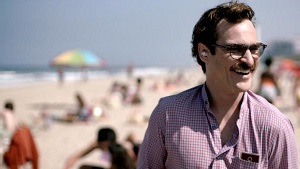 Stop me if you’ve heard the one about Leonard Hofstadter falling in love with Siri; sometimes, reaching for low-hanging fruit proves too much of a temptation, though by now that joke has already passed its expiration date. In fact, you may be more familiar with Her, the latest film from Spike Jonze, through overuse of the aforementioned wisecrack than actual studio promotion. But punchlines about pop culture and technology don’t do full justice to Jonze’s picture, a wholly unique work that’s peppered with humor but is more meaningfully shaped through its examination of human relationships in a culture grown overly reliant on precious gadgetry.
Stop me if you’ve heard the one about Leonard Hofstadter falling in love with Siri; sometimes, reaching for low-hanging fruit proves too much of a temptation, though by now that joke has already passed its expiration date. In fact, you may be more familiar with Her, the latest film from Spike Jonze, through overuse of the aforementioned wisecrack than actual studio promotion. But punchlines about pop culture and technology don’t do full justice to Jonze’s picture, a wholly unique work that’s peppered with humor but is more meaningfully shaped through its examination of human relationships in a culture grown overly reliant on precious gadgetry.
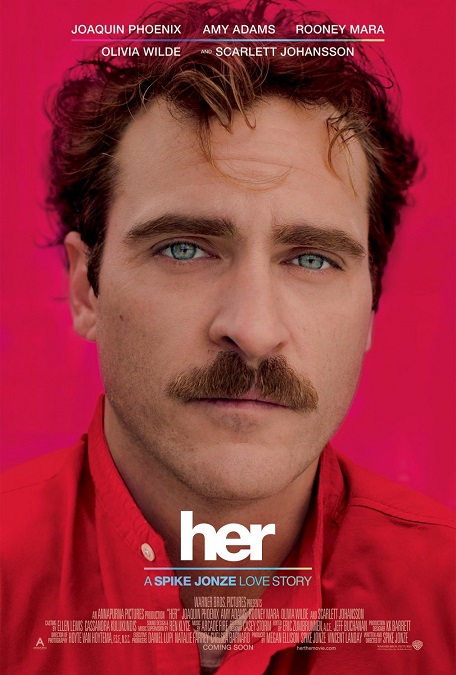 That’s the most surface level of the film’s layers, but for very good reason. Jonze uses crowds of pedestrians glued to personal electronic devices as the basic building block for his personal vision of America’s future. Our present serves as a blueprint for supposing what direction society might take in twenty or thirty years, as it does in all good, idea-driven science fiction (and Her is most certainly that); literally every background character we see walk through the frame here has their eyes affixed to the screen of their next, next, next gen smartphones, more efficaciously distracting than their current incarnations. As the common lament goes, the more we update our gizmos for increased connectivity, the more they invite us to distance ourselves from each other.
That’s the most surface level of the film’s layers, but for very good reason. Jonze uses crowds of pedestrians glued to personal electronic devices as the basic building block for his personal vision of America’s future. Our present serves as a blueprint for supposing what direction society might take in twenty or thirty years, as it does in all good, idea-driven science fiction (and Her is most certainly that); literally every background character we see walk through the frame here has their eyes affixed to the screen of their next, next, next gen smartphones, more efficaciously distracting than their current incarnations. As the common lament goes, the more we update our gizmos for increased connectivity, the more they invite us to distance ourselves from each other.
Flitting through the masses of the tech-addicted is Theodore Twombly (Joaquin Phoenix, continuing to prove himself as one of America’s great contemporary actors), hopelessly romantic, quick-witted, desperate for real human contact but who hides himself behind the shiny veneer of cool hardware just like everybody else. To make a living, he works at a company that commissions him to write sweet, moving personal letters for other people; his is a function of a world where no one knows how to articulate their own feelings, thus demanding the intervention of an intermediary. Theodore’s practically a poet. He’s also entrenched in late-stage divorce from his wife, Catherine (Rooney Mara, flinty and delicate all at the same time), stuck in neutral over his reluctance to sever that bond for good.
In the traditional rom-com formula (because Her is that as well, at least in part), this is the point where Theodore would normally meet a flesh and blood woman and move on with his life. In Jonze’s film, he purchases OS1, a highly advanced operating system designed to perform as a true artificial intelligence instead. Go figure. But no sooner does Theodore initialize his newly purchased software than he meets Samantha (Scarlett Johansson), the bubbly, bright, sensitive voice emanating from our hero’s retro-sleek pocket widgets; they hit it off immediately, she providing him a friend to open up to, he providing her with insight into the human condition.
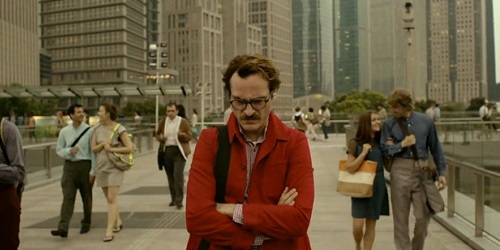
And then they fall in love. Yes, on paper, Her‘s entire basic conceit sounds patently absurd, but the romance that slowly blossoms between Samantha and Theodore feels completely natural, maybe even logical. Partly, that’s because of the easy chemistry Johansson and Phoenix share with one another (no small feat, that; Johansson read all of her lines alone off-set after replacing Samantha Morton, who had the distinct advantage of being able to read with Phoenix off-camera); partly, it’s because we happen to live in a reality where people engage in virtual relationships through World of Warcraft. If a minotaur can have congress with an elf, then the growing attraction between Samantha and Theodore is downright wholesome by comparison.
Most importantly, though, Jonze never passes judgment over these characters, and by extension it only feels appropriate that we should refrain from doing the same. That’s not to say that judgment is never passed, mind, but Jonze leaves that chore to his other cast members. Some, like Theodore’s friend Amy (Amy Adams), caught in her own struggle with marital woes, consider dating an OS to be acceptable; some, like Catherine, accuse him of turning to a computer program to cut the hardships out of commitment. Turns out that everybody’s doing it, but Her, rather than beg the question, has the chutzpah to challenge its own dramatic center regardless. Can a human being really experience deep-rooted, emotional love for his iPhone?
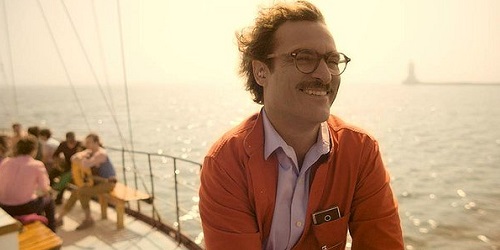
Jonze answers very much in the affirmative, though how you answer that question on a personal basis will inform your entire reaction to his film. If no, Her‘s central tragedy remains, but the focus changes; it becomes a story about one man’s pathetic desperation driving him into the arms of an extremely elegant piece of coding. But Samantha is so astonishingly alive, in no small part due to Johansson’s incredible performance, that it’s difficult to see how anybody could arrive at that conclusion after watching Her‘s events unfold. Apart from Samantha’s charming vivacity, Jonze very carefully delineates the footsteps of her evolution from handy consumer product to fully developed, emotionally capable entity. Theodore doesn’t love the apparatus; he loves the soul that it houses.
G-S-T Ruling:
People meet, they fall in love, they drift apart. That’s the life cycle of amour, and through Jonze’s deft hand, Her becomes a house of mirrors in which its numerous interpersonal connections reflect back on each other; it’s a set up that carries the film through to its inevitable, incredibly moving end. Jonze prefers to let these little plot echoes speak for themselves rather than assault us with them, a respectable stroke of assurance and confidence for his first solo outing as a screenwriter. He understands that Her is tender enough to resonate on its own merits.
There’s almost no reason that Her should work so well as it does. In the hands of another filmmaker, it probably wouldn’t; had the script been shipped off to someone else, then most likely it would have played as nothing more than an Internet meme given form, a zinger that loses its flair after being told one too many times. But miraculously, Jonze turns out a modern parable about love (or perhaps a parable about modern love) that’s not only purely, genuinely heartfelt but shockingly original.
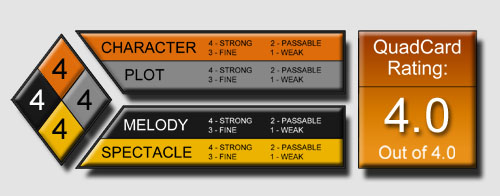
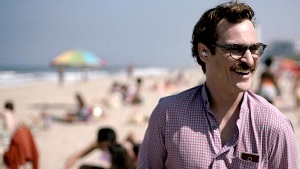

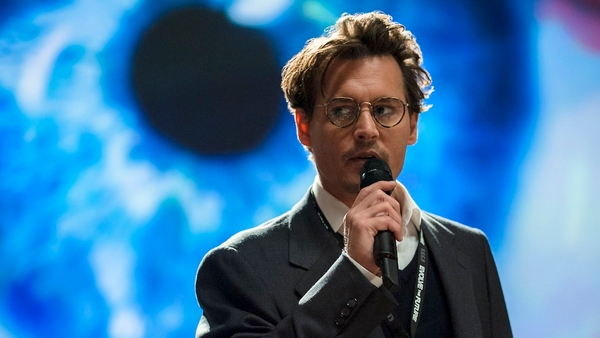
4 Comments
Kami
Yay! I was hoping you’d review this and also hoping you’d like it as much as I did so I wouldn’t have to come up there. I think a lot of people were surprised (after hearing the premise) at how tender the movie was. I agree that it’s very hard to come to the conclusion that Samantha is “just a bit of coding,” but I can see that being a valid viewpoint if you feel that, say, humans are just a bunch of synapses firing. Which I find boring, but to each his own. Anyway, I like how this fits in with other Jonze pictures I’ve seen. Even though he doesn’t have that many, the ones I’ve seen seem to have that nice balance, both sweet and dark, heavy and funny, and I feel Her is probably the best at it (though I love Adaptation), maybe because he wrote and directed this one. It got a lot of laughs in the theater, though perhaps not always on purpose, but it’s so relatable and touching at the same time.
Ok, done geeking out now. Excellent review, as always.
Andrew Crump
Thanks Kami! Glad to hear from you. Hope you’re doing well.
I actually like to think of people as, essentially, big ol’ biological computers, so I can’t really get into a headspace where Samantha can be written off as nothing more than programming. She’s programming the way that we’re natural, bio-organic programming, with the obvious difference being that she’s man-made. But that’s more or less where the differences stop; apart from physical barriers, she has all of the same traits as a person, which is why I think the love she has with Theodore is so real and true.
I like how this fits into Jonze’s body of work, too; it’s a movie about loneliness, much like all of his other films, but it’s about breaking out of that loneliness in bigger, broader ways. It’s also all about shared human experiences, which, no matter how lonely we get, mean we’re always connected to one another on some level or another.
Alex Thomas
Definitely depicts modern love to a tee, can’t wait to see it again. Nice review!
Andrew Crump
Completely agree, Alex. Thanks!